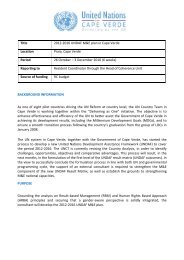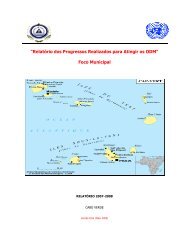PERSPECTIVEAdvocacy through sports:Stopping the spread of HIV among young peopleby Emmanuel Adebayor,professional football playerand Goodwill Ambassadorfor the Joint United NationsProgramme on HIV/AIDS(UNAIDS)“Only 1 in 10adolescents inTogo understandsthe ways inwhich HIV canbe transmitted.”As a youngster growing up in Lomé, Togo, my passionand love for football were fuelled by my desireto play with my friends, to compete, win and, ofcourse, sometimes lose. Today, my profession givesme the chance to see people of varied backgrounds,religions and faiths come together to watch theexciting game of football. In doing so, they celebratediversity from all corners of the earth. Sports andgames possess the unique virtue of cutting acrosscultural and generational gaps. While young peoplemay at times find it hard to communicate withadults, engaging in sports allows families, friendsand, perhaps, even adversaries a window to putaside differences and cheer in unison.I am grateful to have a career in football and toparticipate in top-level clubs. Throughout the timethat I have played, however, I have carried with methe awareness that my homeland – while culturallyrich and vibrant – was suffering from the effects ofpoverty, ill health and lack of access to education. Iwitnessed first-hand the effects of HIV on Africa. Inoticed the singular hardships that confront youngpeople living with HIV, especially those who are marginalized,who live a life of poverty and despair, andthose most at risk: adolescent girls. In sub-SaharanAfrica, girls account for an overwhelming majority ofall infections in young people. Their voices often gounheard. These same young people face stigma,discrimination and exclusion.Motivated by what I had seen, I teamed up withUNAIDS in 2008 to spread global awareness aboutHIV – particularly to young people, as the majority ofour football fans are young. I seized the opportunityto promote a cause in need of special attention.Thanks to UNAIDS, I have the chance to pass on alife-saving message to young people who may nothave access to the information I have regarding HIV.We must all do our part.HIV stands out, not only because of the number ofpeople living with the virus, but because we knowhow to prevent it. Of the 2.5 million HIV-positive childrenunder age 15 in the world, more than 90 per centare in sub-Saharan Africa. At last count, there were120,000 people living with HIV in Togo in a populationof just 6.6 million. Many of them were infected at ayoung age. Only 1 in 7 young women in Togo understandsthe ways in which HIV can be transmitted.During my first year as a Goodwill Ambassador, Ilearned that giving clear and sound information onHIV prevention, treatment, care and support is onething – but changing peoples’ attitudes, beliefs andbehaviour towards those who are infected or seenas vulnerable to HIV infection is a much bigger challenge.Many who are living with HIV still encounterdiscrimination or are reluctant to approach counsellingcentres, accept advice on preventing mother-to-childtransmission or seek antiretroviral treatment for fearof social alienation. In sub-Saharan Africa, 12 millionchildren have been orphaned by AIDS. In Togo alone,88,000 have lost one or both parents to the epidemic,and 94 per cent of those do not receive any medical,educational or psychological support.If young people are to have a chance at living up totheir full potential, they urgently need to know howto protect themselves from HIV infection and whereto find counselling and treatment. This is our onlychance to halt the spread of HIV. I hope to inspireadolescents around the world to speak out on theissues surrounding HIV with the same ardour that Iand other advocates do.With the increasing global popularity of football,sports play an important role as a vehicle for change.HIV can be prevented if each person plays his or herpart in stopping its spread. I have faced hardships inlife, like everyone else, but I have also been fortunateto have enjoyed success on the football pitch. I seethe power of young people every time I play. Thereare more young people on this planet now than everbefore. Their energy and dynamism present a tremendousopportunity for change. We owe it to them toovercome HIV, so that future young people can live inan HIV-free world.Emmanuel Adebayor is a Togolese professional footballplayer titled African Footballer of the Year in 2008. Hewas named Goodwill Ambassador for the Joint UnitedNations Programme on HIV/AIDS (UNAIDS) in 2009 andcontinues to use his popularity to raise awareness aboutthe epidemic globally, particularly the importance ofpreventing new infections among young people.54THE STATE OF THE WORLD’S CHILDREN 2011
are exacerbating those risks, including rapid populationgrowth and urbanization, social exclusion and the risingincidence of drug abuse. Yet juvenile crime or violence isonly part of the story. It is important to recall that manyadolescents come into contact with the law as victims.Whatever the circumstances, effective social work withyouthful offenders and victims is generally lacking in manynational and local settings. Worldwide, UNICEF estimatesthat at any given moment more than 1 million children aredetained by law enforcement officials. 16 And this is likelyan underestimate. In the 44 countries with available data,around 59 per cent of detained children had not been sentenced.17 A 2007 report studying El Salvador, Guatemala,Jamaica, and Trinidad and Tobago found that adolescents15–18 years old – particularly boys – are the most at riskfrom armed violence and confirmed that children are muchmore frequently the victims of armed violence rather thanthe aggressors. 18 In prisons and institutions across theworld, adolescents are often denied the right to medicalcare, education and opportunities for individual development.19 Detention also exposes children toserious forms of violence, such as torture,brutality, sexual abuse and rape, as well aspoor conditions. 20The most disadvantaged adolescentsare at greatest risk of coming intoconflict with the lawThe adolescents most at risk of cominginto conflict with the law are oftenthe product of difficult family circumstances that mightinclude poverty, family breakdown, parental abuse oralcoholism. A large number of juvenile offences are actually‘status offences’ – actions, such as truancy or runningaway from home, that would be acceptable behaviour in anadult and are only outlawed on the basis of age. Anothervery large body of crimes, however, is much more seriousand tends to emerge from adolescents’ involvement ingangs. At their worst, gangs can act as precursors of adultcriminal groups and can effectively involve a ‘career choice’of criminality.“I wish for peaceand stability on theAfrican continent.”Kingford, 19, GhanaAdolescents in gangs, or groups tend to be hierarchicallyorganized but tight-knit, with a rigid internal code ofbehaviour. Many use violence as a routine mechanism forresolving interpersonal conflict, and this culture of violenceis likely to spill over and influence members’ behaviourtowards people outside the group as well, establishing a patternor likelihood of criminality. Territorial gang memberscommit many more crimes than adolescents who do notbelong to gangs, with the most frequent offences involvingviolence and extortion.Juvenile crime is much more likely to be committed bymales than females. In part this is because in some culturesgirls are more restricted by their families and the society atlarge as to what they can do, and many cultures are moretolerant of deviant behaviour among boys than among girls.In addition, aggression is often an established part of theconstruction of masculine identity in male-dominated societies.Though gang culture often does involve the rejection ofsome established adult values, it tends uncritically to importand apply very rigid gender roles.The majority of adolescents who come into conflictwith the law are still children, whose rights underthe Convention must be protected and respectedThe problem of juvenile crime tends to be exacerbatedby economic decline and focused especially in the poorerareas of big cities. Juvenile crime isprimarily an urban problem. It alsohas a relationship with the consumerlifestyle portrayed by the mass media,which creates a desire for products andexperiences that are materially inaccessibleto whole sectors of the populationunless they resort to illegal activities.Drug abuse is also a major factordriving juvenile crime, as addiction isvirtually impossible to finance with the incomes availableto adolescents. Adolescents from disadvantaged groups,including ethnic minorities and migrants, are disproportionatelylikely to offend. 21Most adolescents who come into conflict with the law arestill children, and they need to receive special treatmentfrom the criminal justice system that reflects their status.There are still too many countries where adolescents aresimply absorbed into the adult justice system, both to betried and to serve any eventual sentence. Adolescents whospend periods of pre-trial detention or serve prison sentencesalongside adults are much less likely to be reintegratedinto society when they are released and much more likelyto revert to criminal behaviour.While incarceration is clearly unavoidable in some circumstances,it is essential to explore alternatives to custodialGLobal challenges for adolescents 55
- Page 2 and 3:
© United Nations Children’s Fund
- Page 4 and 5:
AcknowledgementsThis report was pro
- Page 7 and 8:
THE STATE OF THE WORLD’S CHILDREN
- Page 9:
GLobal challenges for adolescents 1
- Page 12 and 13: large cohort of unemployed youth, w
- Page 14 and 15: FOCUS ONEarly and late adolescenceR
- Page 16 and 17: ment and active participation. Disa
- Page 18 and 19: age at which individuals are legall
- Page 20 and 21: the rights of adolescents or to pro
- Page 22 and 23: The Convention was sufficiently ins
- Page 24 and 25: Adolescents are often consideredthe
- Page 26 and 27: HALLENGES ANDRealizing the rights o
- Page 28 and 29: FOCUS ONDemographic trends for adol
- Page 30 and 31: country are particularly serious, g
- Page 32 and 33: Gathering accurate data on adolesce
- Page 34 and 35: sexes, there is still a considerabl
- Page 36 and 37: PERSPECTIVEFacing the challenge:Rep
- Page 38 and 39: FOCUS ONInequality in childhood and
- Page 40 and 41: ADOLESCENT VOICESAct responsibly:Nu
- Page 42 and 43: past decade, though not all of them
- Page 44 and 45: Yet other initiatives against child
- Page 46 and 47: PERSPECTIVEChernobyl 25 years later
- Page 48: Adolescents are deeply concernedabo
- Page 51 and 52: OPPORTUNITIESrisk of climate change
- Page 53 and 54: Poverty, unemploymentand globalizat
- Page 55 and 56: PERSPECTIVEThe effects of climate c
- Page 57 and 58: high-level competencies that are in
- Page 59 and 60: a window for possible economic deve
- Page 61: ADOLESCENT VOICESReclaim Tijuana:Pu
- Page 65 and 66: sentencing wherever possible, inclu
- Page 67 and 68: e stranded in poverty by conflict o
- Page 70 and 71: HALLENGES ANDOver the course of the
- Page 72 and 73: gated by age, disability, sex, ethn
- Page 74 and 75: FOCUS ONPreparing adolescents for a
- Page 76 and 77: the Ministry of Education, in colla
- Page 78 and 79: exactly ‘youth participation’ l
- Page 80 and 81: spaces as part of Aprendiz, the ‘
- Page 82 and 83: PERSPECTIVEAdolescent girls:The bes
- Page 84 and 85: ADOLESCENT VOICESFrom victims to ac
- Page 86 and 87: ReferencesCHAPTER 11United Nations,
- Page 88 and 89: 19United Nations Children’s Fund,
- Page 90 and 91: STATISTICAL TABLESEconomic and soci
- Page 92 and 93: Under-five deaths (millions)Region
- Page 94 and 95: STATISTICAL TABLESapproach is not t
- Page 96 and 97: TABLE 1. BASIC INDICATORSCountries
- Page 98 and 99: TABLE 1. BASIC INDICATORSUnder-5mor
- Page 100 and 101: TABLE 2. NUTRITIONCountries and ter
- Page 102 and 103: TABLE 2. NUTRITIONCountries and ter
- Page 104 and 105: TABLE 3. HEALTHCountries and territ
- Page 106 and 107: TABLE 3. HEALTH% of populationusing
- Page 108 and 109: TABLE 4. HIV/AIDSCountries and terr
- Page 110 and 111: TABLE 4. HIV/AIDSEstimatedadult HIV
- Page 112 and 113:
TABLE 5. EDUCATIONCountries and ter
- Page 114 and 115:
TABLE 5. EDUCATIONPrimary schoolNum
- Page 116 and 117:
TABLE 6. DEMOGRAPHIC INDICATORSCoun
- Page 118 and 119:
TABLE 6. DEMOGRAPHIC INDICATORSPopu
- Page 120 and 121:
TABLE 7. ECONOMIC INDICATORSCountri
- Page 122 and 123:
TABLE 7. ECONOMIC INDICATORSCountri
- Page 124 and 125:
TABLE 8. WOMENCountries andterritor
- Page 126 and 127:
TABLE 8. WOMENCountries andterritor
- Page 128 and 129:
TABLE 9. CHILD PROTECTIONChild labo
- Page 130 and 131:
TABLE 9. CHILD PROTECTIONChild labo
- Page 132 and 133:
Summary indicatorsAverages presente
- Page 134 and 135:
TABLE 10. THE RATE OF PROGRESSCount
- Page 136 and 137:
TABLE 10. THE RATE OF PROGRESSUnder
- Page 138 and 139:
TABLE 11. ADOLESCENTSCountries and
- Page 140 and 141:
TABLE 11. ADOLESCENTSAdolescents po
- Page 142 and 143:
TABLE 12. EQUITYCountries andterrit
- Page 144 and 145:
TABLE 12. EQUITYBirth registration
- Page 146 and 147:
AcronymsAIDSCEDAWDHSFGM/CGDPHIVIUCW
- Page 148:
United Nations Children’s Fund3 U
















